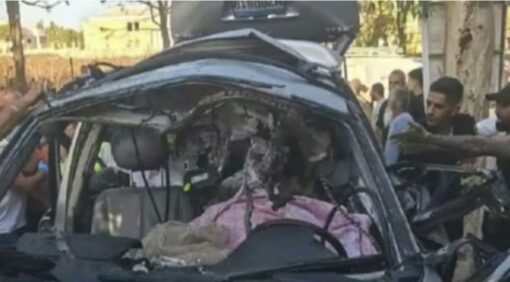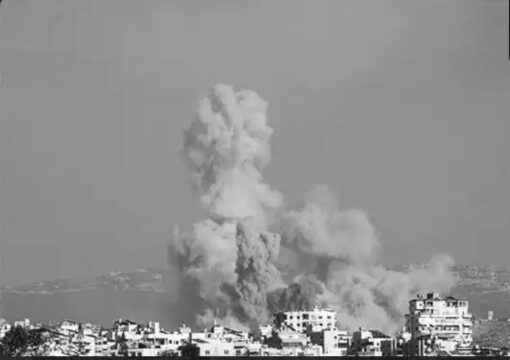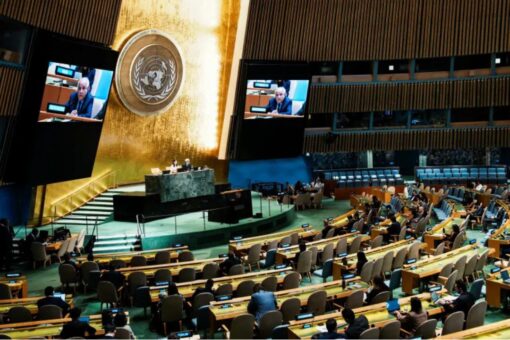An Israeli drone strike on a residential area in southern Lebanon killed five people, including children, in what local residents described as a “massacre” that has once again raised urgent questions about the spiraling conflict across the region.
The attack, which struck the town of Khiam late Sunday evening, left families shattered and homes reduced to rubble, drawing international condemnation and renewed fears of escalation between Israel and Hezbollah.
Eyewitnesses reported that the drone unleashed multiple rounds of fire on a cluster of homes where families had gathered for an evening meal. Among the dead were two children, their bodies later carried through the streets by grieving relatives.
“This was not a military target,” said one survivor, his clothes still covered in dust and blood. “These were innocent children, mothers, fathers—ordinary people who had nothing to do with fighting.”
Local hospitals struggled to cope as ambulances ferried the wounded from the scene. Doctors described the injuries as catastrophic, with shrapnel wounds, burns, and blast trauma overwhelming already stretched medical facilities.
“We are running out of blood supplies,” said a surgeon at Nabatieh hospital. “The civilian toll from these attacks is rising by the day, and we cannot keep up.”
The Israeli military did not immediately release a detailed statement, but unnamed security officials suggested the strike had targeted suspected Hezbollah operatives operating from within the area.

However, residents strongly rejected that account, insisting no fighters were present at the time of the bombing. The conflicting narratives underscore the growing gulf between official justifications and the realities on the ground.
For people in Khiam, the tragedy has revived haunting memories of previous conflicts that devastated southern Lebanon. “This feels like 2006 all over again,” said a 70-year-old woman, referring to the devastating war between Israel and Hezbollah that left thousands dead. “Our children are dying again, and the world is watching silently.”
International reaction was swift, with humanitarian organizations denouncing the strike as a violation of international law. Amnesty International issued a statement calling for an independent investigation into what it described as “an unlawful attack on civilians.”
The United Nations envoy to Lebanon, meanwhile, urged both sides to exercise restraint and avoid actions that could ignite a wider war. “The killing of children in Khiam is intolerable,” the envoy said. “Every effort must be made to protect civilians.”
In Washington, the White House expressed “deep concern” and called for de-escalation, though it stopped short of directly criticizing Israel. European leaders, however, were more outspoken.
France’s foreign minister condemned the “indiscriminate use of drone strikes in populated areas,” while Germany called for an immediate ceasefire to prevent “a humanitarian catastrophe spiraling out of control.”
The incident comes amid weeks of intensified cross-border clashes, with Hezbollah and Israeli forces trading fire almost daily.
Analysts warn that the repeated use of drones in populated areas increases the likelihood of mass civilian casualties, potentially drawing Lebanon deeper into the regional conflict that has already engulfed Gaza.
“Each strike that kills children makes de-escalation harder,” said a Beirut-based security expert. “It fuels anger, grief, and the cycle of retaliation.”
In Khiam, grief quickly turned into outrage. Hundreds of residents poured into the streets for an impromptu funeral march, carrying coffins draped in Lebanese flags and chanting against Israel.
Angry crowds accused the international community of double standards, arguing that civilian deaths in Lebanon receive far less attention than those elsewhere. “Where is the justice for our children?” one protester shouted. “Are our lives worth less?”
The attack has also heightened political tensions inside Lebanon. Leaders of Hezbollah vowed retaliation, declaring that the “blood of children will not be spilled in vain.”
Government officials in Beirut, while cautious not to provoke further escalation, condemned the strike as “a massacre against innocent civilians.” Calls for Lebanon’s army to play a stronger defensive role grew louder, though the military remains cautious given Israel’s overwhelming firepower.
For families of the victims, however, politics felt distant from their immediate reality. In the town’s mosque, relatives wept over the coffins of two children killed in the strike, their tiny bodies wrapped in white shrouds.
“They were playing just minutes before the explosion,” said their father, his voice breaking. “Now I am burying them. What did they do to deserve this?”
The wider humanitarian situation in southern Lebanon is worsening. Thousands of residents have fled border towns over the past month, fearing that Israel’s increasing use of drones and artillery fire signals a broader military campaign.
Displaced families are now crowding into schools and public buildings further north, where aid groups say conditions are dire. Food, clean water, and medical supplies are running dangerously low.
Drone warfare, which Israel has deployed extensively, has become a flashpoint in debates about modern conflict.
Advocates argue drones provide precision targeting and reduce risks to soldiers, but critics warn that in practice, they often strike civilian areas with devastating consequences.
“Technology is no substitute for accountability,” said a representative from Human Rights Watch. “When children are dying in drone strikes, it is clear the system is failing to protect noncombatants.”

As night fell on Khiam, residents sifted through the rubble of destroyed homes, searching for belongings and clinging to fragments of normal life. The sound of mourning prayers mixed with the distant hum of drones still circling overhead, a chilling reminder that the violence was far from over.
For many in Lebanon, the strike was not just a tragedy but a warning of what may come next. The fear of a larger confrontation looms, with regional powers watching closely.
“If this continues, southern Lebanon could become the next Gaza,” said a local analyst. “And once that happens, there may be no turning back.”
The attack that killed five, including children, has left a scar on a community already burdened by decades of war. Whether described as a strike, an accident, or—as survivors insist—a massacre, the result is the same: innocent lives lost, families broken, and an uncertain future darkened by the shadow of drones.


